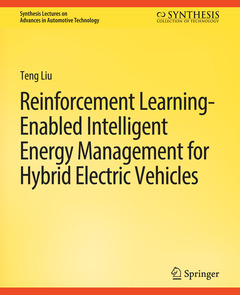Description
Reinforcement Learning-Enabled Intelligent Energy Management for Hybrid Electric Vehicles
Synthesis Lectures on Advances in Automotive Technology Series
Language: English90 p. · 19.1x23.5 cm · Paperback
Description
/li>Contents
/li>Biography
/li>
Powertrain electrification, fuel decarburization, and energy diversification are techniques that are spreading all over the world, leading to cleaner and more efficient vehicles. Hybrid electric vehicles (HEVs) are considered a promising technology today to address growing air pollution and energy deprivation. To realize these gains and still maintain good performance, it is critical for HEVs to have sophisticated energy management systems. Supervised by such a system, HEVs could operate in different modes, such as full electric mode and power split mode. Hence, researching and constructing advanced energy management strategies (EMSs) is important for HEVs performance. There are a few books about rule- and optimization-based approaches for formulating energy management systems. Most of them concern traditional techniques and their efforts focus on searching for optimal control policies offline. There is still much room to introduce learning-enabled energy management systems foundedin artificial intelligence and their real-time evaluation and application.
In this book, a series hybrid electric vehicle was considered as the powertrain model, to describe and analyze a reinforcement learning (RL)-enabled intelligent energy management system. The proposed system can not only integrate predictive road information but also achieve online learning and updating. Detailed powertrain modeling, predictive algorithms, and online updating technology are involved, and evaluation and verification of the presented energy management system is conducted and executed.





